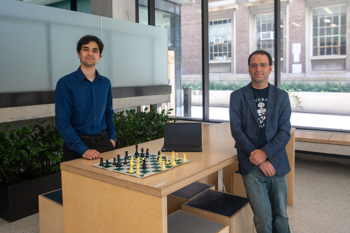U of T Engineering professors Scott Sanner (MIE) and Vaughn Betz (ECE) are among this year’s recipients of the Google Faculty Research Award. The program supports world-class research in computer science, engineering and related fields, and facilitates collaboration between researchers at Google and universities.
Only 15 per cent of applicants receive funding. This year, Google received more than 900 proposals from 50 countries and more than 330 universities worldwide.
“Given the high selectivity of this program, it is a tremendous accomplishment for professors Sanner and Betz to receive Google Faculty Research Awards,” says Professor Ramin Farnood, Vice-Dean of Research, U of T Engineering. “It is a testament to the calibre of their work that they are being recognized amongst the very best institutions in the world.”
Sanner joins a list of researchers from Stanford University, the Massachusetts Institute of Technology (MIT) and Carnegie Mellon University to be awarded in the Machine Learning category. His team will use the funding to develop more personalized and interactive conversational assistants by leveraging recent advances in deep learning.
Although Siri, Alexa and Google Assistant have become useful tools for consumers, Sanner points out that they currently do not provide highly personalized recommendations for questions such as, “What movie should I see tonight?”
“These systems usually can’t handle rich, natural language interactions like, ‘Can you give me something a little lighter?’ in response to a recommendation to see Goodfellas,” says Sanner.
Though it might seem that voice-based assistants are on the brink of achieving those capabilities, Sanner says it’s more complex than most imagine.
Personalized recommendations pose a style of interaction that is very different from the rule-based template and curated web-search technology that largely powers the existing conversational assistants of today.
Getting Siri or Alexa to understand how natural language in human interactions should influence future personalized recommendations means relying on machine learning and deep learning, as opposed to rules and web search.
“To date, few researchers have investigated how these various technologies can dovetail to power interactive, conversation-based recommendations,” adds Sanner.
For Betz — who was awarded in the Systems category alongside researchers from Harvard University, University of Glasgow and Cornell University — the funding will go towards making computer-aided design (CAD) tools to significantly speed up the programming and manufacturing of field-programmable gate arrays (FPGA).
FPGAs are computer chips that can be reprogrammed to be a large variety of circuits, and are used in thousands of today’s electronic systems, from MRI machines to cellphone towers to automotive electronics.
“As we continue to implement extremely complicated systems and larger designs in FPGAs, current CAD tools can take hours or even days to complete, causing major productivity bottlenecks for the engineers doing these designs,” says Betz.
Betz’s team is looking to not only make the CAD tools faster in producing FPGA chips, they want to ensure the tool is general enough that it can efficiently target a wide variety of chips. Their project, Verilog-to-Routing (VTR), will be open source to enable other researchers to build upon their infrastructure.
“Faster tools lead to more productive engineers and hence, better electronic systems,” says Betz.
“It’s great to receive this funding,” he adds. “I know Google funds a very wide variety of research, so it is very competitive. This award is a great validation of the project and helps us expand the scope of our work.”



